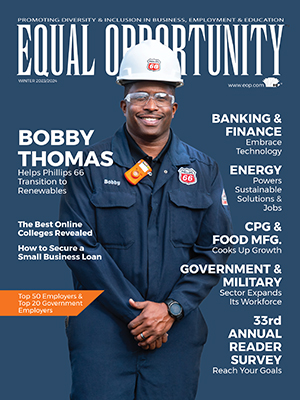| |

Equal Opportunity Magazine, launched in 1968, is a career-guidance and recruitment magazine offered at no charge to qualified African American, Hispanic, Native-American, and Asian-American college students and professionals in career disciplines. Equal Opportunity empowers readers to move ahead in their job search and/or current workplace environment.
This magazine reaches students and professionals nationwide at their home addresses, colleges and universities, and chapters of student and professional organizations.
If you are a student or professional who is a member of a minority group, Equal Opportunity is available to you FREE!

|
|
 Equal Opportunity
Equal Opportunity
» Featured Articles
» Subscription Information
» Reader Survey
» Companies Actively Recruiting

WOMEN SIDESTEP JOB POSTINGS ASKING FOR TRADITIONAL MALE TRAITS
What types of words in employment ads catch your attention? In a study on how leaders are selected and assessed, scientists from Technische Universität München , one of Europe’s leading research institutions, also discovered that the wording of job ads can deter women from applying.
The study demonstrated that women feel less inclined to respond to ads containing frequently used words like “determined” and “assertive” because such words are linked with male stereotypes.
The scientists showed some 260 test subjects fictional employment ads. These included, for example, a place in a training program for potential management positions. If the advertisement described a large number of traits associated with men, the women found it less appealing and were less inclined to apply. Such traits include “assertive,” “independent,” “aggressive,” and “analytical.” Women found words like “dedicated,” “responsible,” “conscientious,” and “sociable” more appealing. For male test subjects, on the other hand, the wording of the job advertisement made no difference.
“A carefully-formulated job posting is essential to get the best choice of personnel,” says Professor Claudia Peus from the Chair of Research and Science Management, who headed the study. “In most cases, it doesn’t make sense to simply leave out all of the male-sounding phrases. But without a profile featuring at least balanced wording, organizations are robbing themselves of the chance of attracting good female applicants. And that’s because the stereotypes endure almost unchanged in spite of all of the societal transformation we have experienced.”
In conjunction with a team from New York University, the scientists demonstrated that traditional perception patterns do apply, not least in respect of leaders.
In a survey of around 600 Americans of both genders, respondents considered women and men to be equally competent, productive, and efficient on a fundamental level. However, they rated men’s leadership skills more highly. The women believed themselves and other women, on average, less capable in this area than the male respondents perceived themselves and others of their gender.
 » Feedback for the Editor
» Feedback for the Editor
» Request Article Copy
|
|